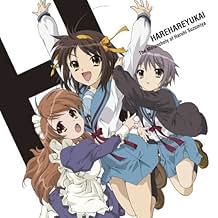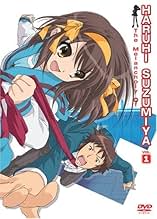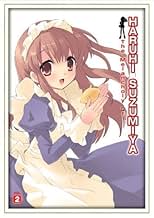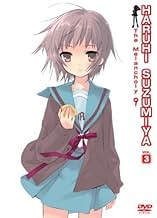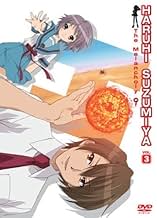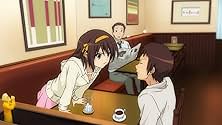La melancolía de Haruhi Suzumiya
Título original: Suzumiya Haruhi no yûutsu
Las locas aventuras de la Brigada SOS, liderada por la carismática Haruhi.Las locas aventuras de la Brigada SOS, liderada por la carismática Haruhi.Las locas aventuras de la Brigada SOS, liderada por la carismática Haruhi.
- Premios
- 2 premios en total
Explorar episodios
Reseñas destacadas
Okay, let me start off by saying that, on the whole, I don't like anime very much. I've enjoyed a couple of the oft-cited "classic" series, but regard the medium as a whole in exactly the same way that I do American television: namely, that a good 90-95% of it is utter tripe, with the remainder falling anywhere from "watchable" to "decent." This being the case, it's no wonder that I don't like the self-deprecating anime parodies out there. I don't get most of the jokes, and the medium itself enforces a certain style of humor that doesn't appeal to me at all - loud, hyperactive, lowbrow, and completely over the top.
So, when I started watching this series at the behest of a friend, I was primed for disappointment after the first couple of episodes. I figured that the characters were supposed to represent cliché characters from shopworn story outlines, and that their actions were supposed to be similarly satirical. I could kind of see where it was coming from, but didn't think that it was all that clever - lots of "wacky, fun-filled high-school shenanigans and goings-on, only now we're being ironic about it." At about the third episode, my opinion drastically changed.
It was at that point that the strengths of this series started to manifest themselves. The quirks of the non-chronological episode order, its snarky sense of self-awareness, and, above all, clever humor with (gasp) a well-executed straight man.
In what I consider to be a rarity in any medium, this show presents well-thought out, witty interactions between diametrically opposed characters. Protagonist Kyon's perpetual sense of vaguely annoyed resignation provides the perfect foil to the actions of title character Haruhi's generic "anime-like" exploits. It's a break from formula, and it works incredibly well.
Based on that strong foundation, the series further succeeds with a truly phenomenal level of attention to detail. As previously stated, the episodes air out of chronological order. I considered this to be a gimmick at first, but it works surprisingly well. The chronological sequence of events makes sense logically, but the aired order of the episodes more closely follows the traditional structure of Aristotelian drama. The order chosen leaves no narrative gaps that cannot be filled by simple inference (but while it is possible to guess what happened in an unaired "preceding" episode, one still feels compelled to watch exactly how those events unfold), and superb planning prevents any plot holes or contradictions. I watched this series a second time immediately upon completing it the first time, and I was amazed at how well even seemingly inconsequential events were all tied together.
The last point is indicative of the extreme attention to detail in every area of the series. While the stock "anime" character designs grate a bit, the background art is exquisite, realistically rendered based upon actual photographic references. Animation quality is also excellent at important points. For example there is a musical performance late on in the series in which the characters are shown actually playing a song - this may sound trivial, but the subconscious effect of watching (film-quality) animation which actually corresponds to the soundtrack is incredible.
In short, I love this series for some reason. By its very nature it is something that I generally dislike, but its execution is so unique and well-carried out that I can't help it.
So, when I started watching this series at the behest of a friend, I was primed for disappointment after the first couple of episodes. I figured that the characters were supposed to represent cliché characters from shopworn story outlines, and that their actions were supposed to be similarly satirical. I could kind of see where it was coming from, but didn't think that it was all that clever - lots of "wacky, fun-filled high-school shenanigans and goings-on, only now we're being ironic about it." At about the third episode, my opinion drastically changed.
It was at that point that the strengths of this series started to manifest themselves. The quirks of the non-chronological episode order, its snarky sense of self-awareness, and, above all, clever humor with (gasp) a well-executed straight man.
In what I consider to be a rarity in any medium, this show presents well-thought out, witty interactions between diametrically opposed characters. Protagonist Kyon's perpetual sense of vaguely annoyed resignation provides the perfect foil to the actions of title character Haruhi's generic "anime-like" exploits. It's a break from formula, and it works incredibly well.
Based on that strong foundation, the series further succeeds with a truly phenomenal level of attention to detail. As previously stated, the episodes air out of chronological order. I considered this to be a gimmick at first, but it works surprisingly well. The chronological sequence of events makes sense logically, but the aired order of the episodes more closely follows the traditional structure of Aristotelian drama. The order chosen leaves no narrative gaps that cannot be filled by simple inference (but while it is possible to guess what happened in an unaired "preceding" episode, one still feels compelled to watch exactly how those events unfold), and superb planning prevents any plot holes or contradictions. I watched this series a second time immediately upon completing it the first time, and I was amazed at how well even seemingly inconsequential events were all tied together.
The last point is indicative of the extreme attention to detail in every area of the series. While the stock "anime" character designs grate a bit, the background art is exquisite, realistically rendered based upon actual photographic references. Animation quality is also excellent at important points. For example there is a musical performance late on in the series in which the characters are shown actually playing a song - this may sound trivial, but the subconscious effect of watching (film-quality) animation which actually corresponds to the soundtrack is incredible.
In short, I love this series for some reason. By its very nature it is something that I generally dislike, but its execution is so unique and well-carried out that I can't help it.
This show is great. Not only is "Haruhai Suzumiya" a very well written anime show, it also reflects things like Philosophy, Science Fiction and a little religion. It's hilarious at some points and "cute" (for lack of a better term) at others. Actually this may be effect to my lack of experience with Japanese anime shows, but it is one of the best of its genre I have seen.
I mainly have to give credit to the writers. I haven't seen such brilliant scopes of imagination in a television show since the original Star Trek. I hope the writers continue to add strange new characters and give more insight on the already great characters that have been added.
9/10
I mainly have to give credit to the writers. I haven't seen such brilliant scopes of imagination in a television show since the original Star Trek. I hope the writers continue to add strange new characters and give more insight on the already great characters that have been added.
9/10
Good animation, nice character design, and a light-hearted story make Suzumiya Haruhi no Yuutsu enjoyable to watch.
After my first viewing, I thought that this anime was pretty good, but but was much better on for a second watch.
This is because it is done out of chronological order, and once you re watch it in correct order you notice connections you didn't see before. (OR it may be that you see a second meaning to some events you didn't notice before) You may want to read the original novels (not manga) by Tanigawa Nagaru before/after seeing this. The anime is very good at visualizing every detail in the stories it shows.
However, there are some short stories from the book that are not animated, but are referenced to.(bamboo w/ wishes attached shown in episode 14) Overall, this anime is actually very good once after brief analyzation of the plot (reading the book improves upon it as well). It is a nice break from the shounen-jump anime that seem to be taking over.
After my first viewing, I thought that this anime was pretty good, but but was much better on for a second watch.
This is because it is done out of chronological order, and once you re watch it in correct order you notice connections you didn't see before. (OR it may be that you see a second meaning to some events you didn't notice before) You may want to read the original novels (not manga) by Tanigawa Nagaru before/after seeing this. The anime is very good at visualizing every detail in the stories it shows.
However, there are some short stories from the book that are not animated, but are referenced to.(bamboo w/ wishes attached shown in episode 14) Overall, this anime is actually very good once after brief analyzation of the plot (reading the book improves upon it as well). It is a nice break from the shounen-jump anime that seem to be taking over.
8cvr2
At first sight this is yet another highschool anime with lots of excuses for 'fanservice', but there is a lot more going on. The 'fanservice' is part of the plot, the main character is a tired cynic (unusual), and most importantly there is a clever plot that ties all the episodes together, and that poses some interesting questions. The episodes are deliberately non-chronological, and it is certainly worth watching the series again in chronological order.
The series is worth watching carefully, because there are a lot of casual hints in there that foreshadow and explain things, plus a good number of in-jokes about other series, anime and other.
The series is worth watching carefully, because there are a lot of casual hints in there that foreshadow and explain things, plus a good number of in-jokes about other series, anime and other.
A very strange and interesting show. Some parts I really did enjoy and some not so much. Some characters seem to have a lot of depth while other are shallow. I can imagine this being really great when it was released, I probably would have liked it more as a teenager.
¿Sabías que...?
- CuriosidadesOriginally, the episodes were intentionally aired/shown out of sequence. What was shown as Episode 01 is actually Episode 11. In the 'coming soon' blurb at the end of each episode, Haruhi gave the chronologically correct number of the next episode, and Kyon 'corrected' her by giving the 'wrong' episode number - the one that corresponds to the order it is being shown in. When new episodes were produced in 2009, the whole series aired again, this time in chronological order.
- Citas
[Haruhi has been told that her plot to frame the Computer Brigade leader of harassing Mikruru will fail because so many witnesses will deny it]
Haruhi Suzumiya: Then I'll tell everyone you thugs gained up on her and
[bleep]
Haruhi Suzumiya: ed her!
- Créditos adicionalesThe Character Haruhi Suzumiya is listed as ULTRA DIRECTOR.
- Versiones alternativasFor home video release and the 2009 re-run in Japan, newly animated scenes were added to some first season episodes to make them more faithful to Nagaru Tanigawa's novel.
- ConexionesFeatured in Adventures in Voice Acting (2008)
Selecciones populares
Inicia sesión para calificar y añadir a tu lista para recibir recomendaciones personalizadas
- How many seasons does The Melancholy of Haruhi Suzumiya have?Con tecnología de Alexa
Detalles
- Fecha de lanzamiento
- País de origen
- Sitios oficiales
- Idiomas
- Títulos en diferentes países
- The Melancholy of Haruhi Suzumiya
- Empresas productoras
- Ver más compañías en los créditos en IMDbPro
Contribuir a esta página
Sugerir un cambio o añadir el contenido que falta

Principal laguna de datos
What is the French language plot outline for La melancolía de Haruhi Suzumiya (2006)?
Responde

